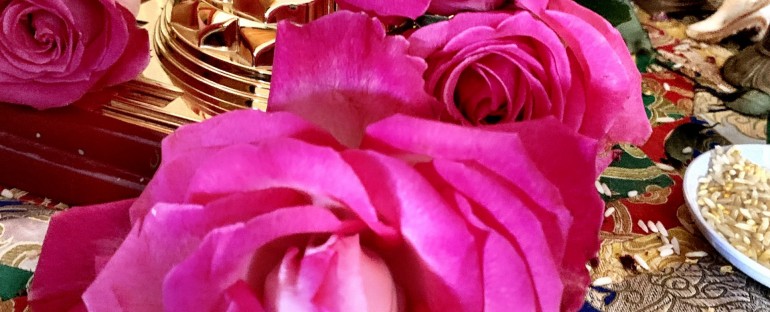Are you feeling dismayed, stressed, and helpless in the face of the current conflict and uncertainty? During this time when the world is experiencing the growing pains that accompany change, the need for compassion is greater than ever. One of the first things the teachers at the ashram taught us was the importance of the “flowering of the heart.” This is the first step on the spiritual path in order to really progress, they told us. And this applies to our lives in general. I liked this image of the heart as a flower opening, but what does this really mean and how exactly does the heart flower? It seems that the heart opens at times and closes at other times. Is it possible to live with a heart that is always open?
Like the breath or anything connected to the body and mind, the heart does tend to move between opposite poles. But according to Stuart Mooney, one of my spiritual mentors, there are two hearts. He explained that one is the dual, relative heart—my heart and your heart, a relationship between a subject and object. It connects you with another. It can transcend the boundaries of the body so that you can feel for another. It is changeable, temporary, emotional. It is subject to opening and closing. He said the other heart is the divine heart—the crown chakra. the love of the relative heart is conditional. the love of the crown is unconditional, changeless, fundamental, that which ties all things together. You cannot measure it, you cannot locate it. It’s beyond the capability of the mind to comprehend yet it is all-pervading. It is purely experiential and cannot be reflected upon. It is neither a subject nor an object. It is the true Self. When this heart is awakened in us, we become love. The purpose of the spiritual path is to awaken this unconditional heart. And sometimes when the relative heart breaks open, the spiritual heart begins to blossom.
As I considered the flowering of the heart, I thought of the hospice group I was facilitating at the time I visited the ashram. The hearts of the group members, all of whom had lost an infant, had certainly been broken by their losses. Loss can open our hearts, but this doesn’t happen automatically. Sometimes we can become bitter in the face of pain and suffering, and our hearts can close in an effort to protect ourselves from further pain. This seems to be happening in our world today as we struggle with the effects of the pandemic. But closing down our hearts only creates more suffering. Surrendering to the pain of heartbreak and allowing healing to happen requires being vulnerable, as the hospice group members experienced over time. Their hearts were broken open due to their losses and through these losses they began the process of learning to live with open hearts.
A loss as great as losing a child can break down our defenses so that we have no choice but to surrender, to open to what is. Of course, the heartbreak of grief is a complex process and is different for everyone, but one thing is certain—resisting the process makes it more difficult. Allowing the waves of emotion to crash and break over us can teach us we will survive, that it is safe for the heart to open. I was witness to this process in the parents who came to the group each week. They gradually began to trust life again. Their lives took on a new shape as their broken hearts adjusted to their losses—each on their own timetables.
It seems the heart wants to flower but needs encouragement, it needs the right conditions to learn that opening is safer than closing. A closed heart doesn’t understand its connection to life, its oneness with all things. Without this understanding, it remains in fear of the outside world. When the heart is open, we can begin to experience suffering in a broader context as belonging to humanity rather than to our own limited self. The unconditional heart naturally wants to reach out to heal that suffering.
The hospice group was a crucible to facilitate the awakening of the heart. We all felt our common humanity. We are all in different places on this journey called life, but the experience of loss is shared by us all here on Earth. Change is the nature of life. And change means loss. For the parents in the hospice group, vulnerability, surrender, and compassion became their companions as they developed the capacity to live with their broken hearts. Right now, the whole world is experiencing the loss, uncertainty and heartbreak that accompany profound change. Especially at this time, we could all benefit from the lessons these parents learned as they struggled to come to terms with the death of their babies.
CONSIDER THIS: Can you view the losses and heartbreak in our world today as an opportunity to allow your heart to awaken?
Recent Posts
Recent Comments
- Terry Scott on CONTEMPLATING THE UNKNOWABLE
- Irene Kokatay on THE PATH OF SELF-KNOWLEDGE
- Terry on THE PATH OF SELF-KNOWLEDGE
- Irene Kokatay on LIVING IN INFINITY
- Terry Scott on LIVING IN INFINITY




